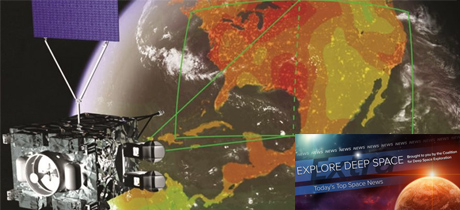In Today’s Deep Space Extra… NASA crossed another milestone this week in its preparations for Artemis I, an upcoming uncrewed test flight of the Space Launch System and Orion capsule around the Moon and back to Earth. Meanwhile, Russia and China appear poised to enter a long-term agreement intended to lead to a human lunar research station.
Human Space Exploration
NASA’s Artemis I lunar mission finishes countdown test
Space.com (1/25): NASA reports that the ground launch software and sequencer assigned to the launch of Artemis I from NASA’s Kennedy Space Center (KSC) completed a second countdown sequencing test this week inside the Vehicle Assembly Building (VAB), where the Space Launch System (SLS) rocket and Orion crew capsule have been stacked for their first integrated flight, Artemis I. Coming soon is the Artemis I Wet Dress Rehearsal in which the rocket and capsule will be moved to their launch pad in February for a countdown rehearsal that will include fueling the rocket and tracking through all but the final seconds of an actual liftoff. The hardware will then be returned to the VAB for a checkout while data from the rehearsal is assessed and plans for the actual launch are finalized. Artemis I is to set the stage for Artemis II, which will send a crew of astronauts around the Moon and back to Earth, and Artemis III, which is to land at the south pole of the Moon with astronauts for a week-long stay.
Russia, China set to sign lunar station deal soon envoy
TASS of Russia (1/25): Russia and China may soon sign an agreement outlining their planned cooperation in establishing an international lunar station, Andrey Denisov, Russia’s Ambassador to China, announced at a press conference on Tuesday. The envisioned agreement includes uncrewed missions followed by establishment of a human lunar station in the 2035 timeframe, according to Chinese media reports. A new five-year cooperative program in the works would succeed the current cooperative program between the two space powers initiated in 2018 and set to expire in 2022. (Editor’s note: TASS is a Russian government-owned news source).
Space Science
Cause of Lucy solar array deployment problem identified
SpaceNews.com (1/25): The science team behind NASA’s Lucy mission, which launched in mid-October to conduct the first explorations of Trojan asteroids believes they’ve identified why one of two circular solar arrays failed to fully deploy following liftoff. A motor-driven lanyard responsible for deploying and latching the array into place experienced a loss of tension, probably as the lanyard escaped from its spool. Ground teams can try again to activate the motor or leave the configuration as is, since power generation is not an issue, said Hal Levison, principal investigator for Lucy at the Southwest Research Institute, during a meeting of the NASA Small Bodies Assessment Group on Tuesday.
Other News
Federal Trade Commission blocks Lockheed Martin’s acquisition of Aerojet Rocketdyne
Coalition Members in the News – Aerojet Rocketdyne, Lockheed Martin, Northrop Grumman
SpaceNews.com (1/25): The Federal Trade Commission (FTC) announced Tuesday that it is blocking Lockheed Martin’s proposed $4.4 billion acquisition of rocket engine manufacturer Aerojet Rocketdyne with a lawsuit. Lockheed announced its acquisition intent in December 2020. The FTC contends the purchase would harm rival defense contractors and lead to further consolidation of multiple markets essential to U.S. national security and defense. Aerojet is a provider of power, propulsion and armament systems used in the missiles developed by Lockheed and other defense prime contractors. Lockheed stated it will review the lawsuit and evaluate its options, including termination of the merger agreement.
Military space advocate Rep. Jim Cooper to retire from Congress
SpaceNews.com (1/25): U.S. Rep. Jim Cooper, a Tennessee Democrat who with U.S. Rep. Mike Rogers, an Alabama Republican, were the original proponents of a U.S. Space Force, announced Tuesday that he will not run for re-election in November. Cooper is chair of the House Armed Services Committee’s subcommittee on strategic forces and has served in the House for 32 years. Due to action by the state legislature, Cooper’s Nashville district has been redrawn and likely to be won by a Republican contender.
NASA hosted payloads waiting for rides to orbit
Coalition Member in the News – Maxar
SpaceNews.com (1/25): A NASA official said at the American Meteorological Society meeting that the agency is facing difficulties sending satellites to orbit as hosted payloads on commercial satellites. The agency is looking for a geostationary satellite to house the Geostationary Carbon Cycle Observatory. It’s also facing delay in sending the Multi-Angle Imager for Aerosols to low Earth orbit. The geostationary communications satellite market has experienced change after the emergence of satellite constellations in low Earth orbit. However, the hosted payload process is proceeding well for TEMPO, a sensor to monitor pollution over North America. NASA chose Maxar to find a host for TEMPO.

